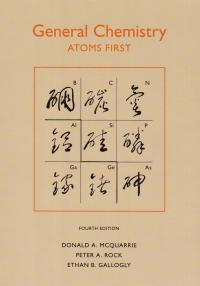General Chemistry
General Chemistry
By: Donald A. McQuarrie, Peter A. Rock, Ethan B.Gallogly
This Fourth Edition of McQuarrie's classic text offers a thorough revision and a quantum-leap forward from the previous edition. Taking an atoms first approach, it promises to be another ground-breaking text in the tradition of McQuarrie's many previous works. This outstanding new text, available in a soft cover edition, offers professors a fresh choice and outstanding value.
For all sales outside of the United States, please contact Felicity Henson, fhenson@aip.org
Title information
This Fourth Edition of McQuarrie’s classic text offers a thorough revision and a quantum-leap forward from the previous edition. Taking an atoms first approach, it promises to be another ground-breaking text in the tradition of McQuarrie’s many previous works. This outstanding new text, available in a soft cover edition, offers professors a fresh choice and outstanding value.
1. Chemistry and the Scientific Method
2. Atoms and Molecules
Interchapter A: Elemental Etymology
3. The Periodic Table and Chemical Periodicity
Interchapter B: A Brief History of the Periodic Table
4. Early Quantum Theory
5. Quantum Theory and Atomic Structure
Interchapter C: Hydrogen and Oxygen
6. Ionic Bonds and Compounds
Interchapter D: The Alkali Metals
7. Lewis Formulas
Interchapter E: Nitrogen
8. Prediction of Molecular Geometries
Interchapter F: Saturated Hydrocarbons
9. Covalent Bonding
Interchapter G: Unsaturated Hydrocarbons
10. Chemical Reactivity
Interchapter H: Aromatic Hydrocarbons
11. Chemical Calculations
Interchapter I: The Main Group Metals
12. Chemical Calculations for Solutions
Interchapter J: Sulfur
13. Properties of Gases
Interchapter K: The Noble Gases
14. Thermochemistry
Interchapter L: Sources of Energy
15. Liquids and Solids
Interchapter M: Carbon and Silicon
16. Colligative Properties of Solutions
Interchapter N: Phosphorus
17. Chemical Kinetics: Rate Laws
Interchapter O: Radiochemistry
18. Chemical Kinetics: Mechanisms
Interchapter P: Alcohols, Aldehydes and Ketones
19. Chemical Equilibrium
Interchapter Q: The Halogens
20. The Properties of Acids and Bases
Interchapter R: Carboxylic Acids
21. Buffers and the Titration of Acids and Bases
Interchapter S: Synthetic Polymers
22. Solubility and Precipitation Reactions
Interchapter T: Biochemical Polymers
23. Chemical Thermodynamics
24. Oxidation-Reduction Reactions
25. Electrochemistry
Interchapter U: Batteries
26. The Chemistry of the Transition Metals
Appendices A-I
Index
|
“Instructors looking for a no-nonsense yet comprehensive and pedagogically balanced general chemistry textbook need look no further than General Chemistry, 4th edition by McQuarrie, Rock, and Gallogly.” “What was true for McQuarrie’s Quantum Chem, Stat Mech, Chem Thermo and Phys Chem is now true for McQuarrie’s Gen Chem. If you want to learn (or teach) the subject, the “McQuarrie Brand” isn’t a question — it’s the answer.” “McQuarrie is a genius.” “An overwhelming majority of our students thought that the McQuarrie text and its accompanying online homework promoted their learning. Even though only a minority in the class were chemistry majors, nearly three quarters thought that the course material was intellectually stimulating! The engaging writing style and logical presentation of McQuarrie’s GEN CHEM text clearly resonates with students.” “McQuarrie’s atoms-first approach is a well-structured and accessible survey of the fundamental principles — and, more importantly, their hierarchy — by which modern chemists understand their discipline.” “I love the text and have no intention of giving up my relationship with one of the brightest lights in the chemistry text universe.” “McQuarrie and Rock have been mainstays in the diet of every student studying the physical principles of chemistry. It is with this insight and understanding that they have written a tremendously useful and clear text for students entering the study of chemistry. This, combined with a publisher bucking the trends of current publishing practices, makes the field of chemistry and the students thereof the beneficiaries.” “My students absolutely love this text. It’s not encyclopedic, but a readable text. We covered 16 chapters in the first semester and they understand the material. Now we have the time to cover special topics.” “Atoms First seems to be the flavor of the year in chemistry textbooks, but many of them seem to be little more than rearrangement of the chapters. It takes a master like McQuarrie to go back to the drawing board and create a logical development from smallest to largest that makes sense to students.” “Because I have long appreciated McQuarrie’s writing style and straightforward approach in his classic Physical Chemistry text, I naturally jumped at the chance to use his General Chemistry text in my classes. The new book does not disappoint; McQuarrie’s elegant, yet step-by-step manner permeates the text.” “McQuarrie’s book is extremely well-written, the order of topics is logical, and it does a great job with both introductory material and more advanced concepts. Students of all skill levels will be able to learn from this book.” “Just as McQuarrie led intimidated seniors through the depths of physical chemistry, he now guides freshmen through the snares of general chemistry in this brilliantly written text.” “Recommended!” “We absolutely love this book.” “Teaching Gen Chem with McQuarrie is great. In this course, we do a fair bit of nuclear, organic and biochemistry, so we are making good use of the interchapters.” |
Donald A. McQuarrie
As the author of landmark chemistry books and textbooks, Donald McQuarrie's name is synonymous with excellence in chemical education. From his classic text on Statistical Mechanics to his recent quantum-first tour de force on Physical Chemistry, McQuarrie's best selling textbooks are highly acclaimed by the chemistry community. McQuarrie received his PhD from the University of Oregon, and is Professor Emeritus from the Department of Chemistry at the University of California, Davis.
Ethan B.Gallogly
Ethan Gallogly earned his BS from the University of Connecticut and his PhD from the University of California, Davis. Following completion of his doctoral studies, Gallogly, who is bilingual, worked as a foreign expert in Mainland China. Afterward, he accepted a position at the University of California at Berkeley as a Chemistry Lecturer and Laboratory Coordinator for three years before joining the faculty of Santa Monica College in 1999. Most recently, Gallogly has been awarded a sabbatical to research fuel cell technology at Sichuan University.

